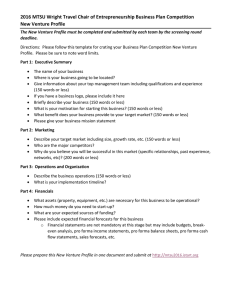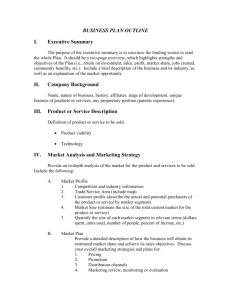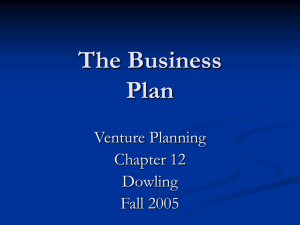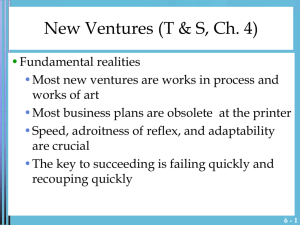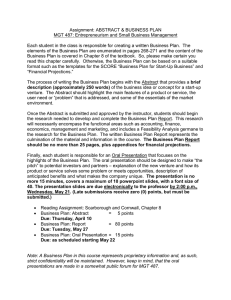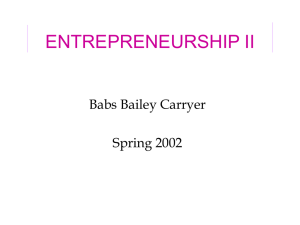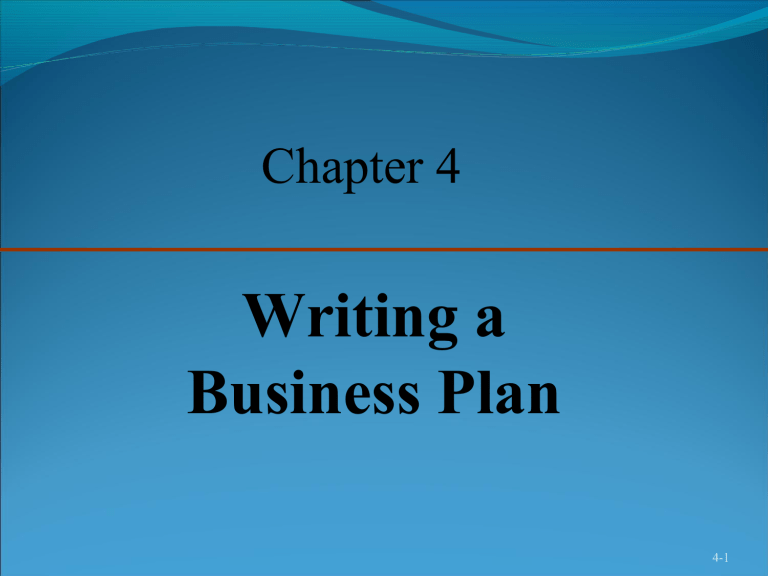
Chapter 4 Writing a Business Plan 4-1 What Is a Business Plan? Business Plan A written document that describes in detail how a new business is going to achieve its goals…A business plan layout a written plan from a marketing, financial and operational viewpoint.. A business plan is a written description, typically 25 to 35 pages long, that describes what a new business idea/plan to accomplish. Dual-Use Document For most new ventures, the business plan is a dual-purpose document used both inside and outside the firm. 4-2 Why Reads the Business Plan—And What Are They Looking For? There are two primary audience for a firm’s business plan Audience What They are Looking For A Firm’s Employees A clearly written business plan helps the employees of a firm to operate and move forward in a consistent and purposeful manner. Investors and other external stakeholders A firm’s business plan must make the case that the firm is a good use of an investor’s funds or the attention of others. 4-3 What are the forms of a Business Plan? Document Sample Slides Film Demonstration 4-4 Benefits/Reasons for Writing a Business Plan Initial planning document for a new business. Serves as a tool to communicate the idea of the new venture to potential investors, bankers, key employees. Serves as a record to monitor and compare results. To obtain bank financing. To obtain investment funds. To establish strategic alliances. To obtain initial contracts. To attract key employees. To motivate and focus your management team Questions a start-up business plan should answer The plan is meant to be read by potential finance providers (banks etc) or business owners /shareholders. So it ought to provide convincing and realistic answers to questions such as: •What is the business idea or opportunity? •What is the product and how is it different or unique? •What is the target market segment and who are the potential competitors? •How large is the target market and is it growing? •Who are the customers; how much will they buy and at what price? •What will it cost to produce and sell the product? •Can the product be made and/or sold profitably? •At what stage will the business break-even and what are the likely profits? •What investment is required to launch and establish the business? •Where will the money come from? •What are the main risks facing the business and how to handle them? Types/ level of Business Plans What Should a Business Plan Contain? 1.Title Page 2.Table of Contents 3.Executive Summary and Fact Sheet 4.Body of the Plan The Company description The Product/Service Offering Industry Analysis Market Analysis The Marketing Plan The Production/Operations Plan The Management Team Implementation Schedule and Risks Associated with the Venture The Financial Plan 5.Appendices Section 1: Executive Summary Executive Summary The executive summary is a short overview of the entire business plan It provides a busy reader with everything that needs to be known about the new venture’s distinctive nature. An executive summary shouldn’t exceed two single-space pages. 4-9 Section 2: Company Description Company Description The main body of the business plan beings with a general description of the company. Items to include in this section: Company description. Company history. Mission statement. Products and services. Current status. Legal status and ownership. Key partnerships (if any). 4-10 Section 3: Industry Analysis Industry Analysis This section should being by describing the industry the business will enter in terms of its size, growth rate, and sales projections. Items to include in this section: Industry size, growth rate, and sales projections. Industry structure. Key success factors. Long-term prospects. 4-11 Section 4: Market Analysis Market Analysis The market analysis breaks the industry into segments and zeros in on the specific segment (or target market) to which the firm will try to appeal. Items to include in this section: Market segmentation and target market selection. Buyer behavior. Competitor analysis. 4-12 Section 5: Marketing Plan Marketing Plan The marketing plan focuses on how the business will market and sell its product or service. Items to include in this section: Overall marketing strategy. Product, price, promotions, and distribution. 4-13 Section 6: Management Team and Company Structure Management Team and Company Structure The management team of a new venture typically consists of the founder or founders and a handful of key management personnel. Items to include in this section: Management team. Board of directors. Board of advisers. Company structure. 4-14 Section 7: Operations Plan Operations Plan Outlines how your business will be run and how your product or service will be produced. Items to include in this section: Business location. Facilities and equipment etc. 4-15 Section 8: Product (or Service) Design and Development Plan Product (or Service) Design and Development Plan If you’re developing a completely new product or service, you need to include a section that focuses on the status of your development efforts. Items to include in this section: Development status and tasks. Challenges and risks. Intellectual property. 4-16 Section 9: Financial Projections Financial Projections The final section of a business plan presents a firm’s pro forma (or projected) financial projections. Items to include in this section: Sources and uses of funds statement. Assumptions sheet. Pro forma income statements. Pro forma balance sheets. Pro forma cash flows. 4-17 Presenting the Business Plan to Investors The Oral Presentation The first rule in making an oral presentation is to follow directions. If you’re told you have 15 minutes, don’t talk for more than the allotted time. The presentation should be smooth and well-rehearsed. The slides should be sharp and not cluttered. Questions and Feedback to Expect from Investors The smart entrepreneur has a good idea of the questions that will be asked, and will be prepared for those queries. 4-18 Presenting the Business Plan to Investors Twelve PowerPoint Slides to Include in an Investor Presentation 1. 2. 3. 4. 5. 6. Title Slide Problem Solution Opportunity and target market Technology Competition 7. Marketing and sales 8. Management team 9. Financial projections 10. Current status 11. Financing sought 12. Summary 4-19 Presenting the Business Plan to Investors 3 of 3 • It’s also important to look sharp when presenting a business plan. • This new venture team is going over its PowerPoint slides one last time before an investor presentation. 4-20
